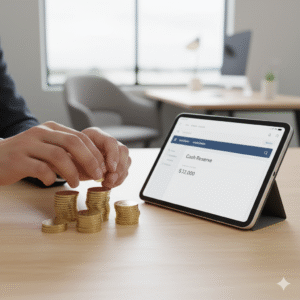How to Make EOFY Less Stressful
Business owners often feel both scared and rushed at the end of the financial year. It’s time to finish up your accounts, file your taxes, and figure out a complicated set of rules. This yearly rush can make what should be a time of planning and reflection feel like a stressful administrative marathon. Many people think of EOFY as a time when they have to stay up late, deal with a lot of paperwork, and worry about missing out on important savings or making a costly mistake.
This guide is here to tell a different story. We’ll show you how to turn tax time from a time of stress into a time to plan. By understanding your obligations, knowing what you can claim, and planning ahead, you can make the EOFY process significantly less taxing. This post gives you a complete guide with useful tips based on real-life experiences to help you confidently handle your tax duties. You’ll learn how to use technology and understand deductions so that you can not only get through tax time, but also use it to help your business.
Getting to Know Important Tax Deductions
One of the best ways to make EOFY less stressful on your bank account is to know what deductions you can take and file for them. A tax deduction is an expense that you can take off your taxable income. This lowers the amount of tax you have to pay. To be able to deduct an expense, it has to be directly related to making money.
Businesses often claim these types of deductions:
Costs of Running
These are the costs of running your business every day. Think of them as the gas that keeps your business running. Some examples are:
- Stationery, printer ink, and other common office supplies are all examples of office supplies.
- Rent and Utilities: The costs of running your business, such as electricity, water, and internet. You can get a tax break on some of your household utility bills if you work from home.
- Salaries and wages are the money you pay your employees, including their superannuation contributions.
- Costs for marketing and advertising your business, like hosting your website, running ads on social media, and making print materials.
Costs of Capital
These are costs for important things that will help your business for more than a year. You usually can’t get back the full amount you paid for it in the year you bought it. Instead, you claim the asset’s depreciation, or drop in value, over its useful life.
- Computers, printers, and other specialised machines are some of the equipment.
- Vehicles: Cars or vans that are used for work.
- Furniture includes desks, chairs, and other things you use in an office.
- Temporary full expensing rules have sometimes let businesses write off the full cost of eligible assets right away. That’s why it’s important to check the rules for the current financial year.
Training and Professional Development You can often deduct the cost of improving your skills or those of your team. If you’re wondering “are books tax deductible?”, the answer is yes, provided they are directly related to your work.
- Courses and Seminars: Costs for classes, workshops, and conferences that help you become more knowledgeable in your field.
- Subscriptions: Costs for professional publications, industry journals, and memberships in professional groups.
- Reference Materials: Books and digital tools that you need to do your job.

How to Keep Track of Your Expenses and Get Them Back
It’s only half the battle to know what you can claim. The other half is having the records to prove it. Keeping accurate records is a must if you want to make tax time easier and get the most deductions.
Step 1: Set up a system
Pick a system that works for you and stick with it. You could use a simple spreadsheet, a special accounting program, or a shoebox for receipts (but digital methods work much better). Being consistent is the key.
- Use Business Bank Accounts: Always keep your business income and expenses in a separate bank account and credit card. This makes it easier to tell the difference between business and personal spending and keeps your finances clean.
- Make Everything Digital: Scan or take photos of all your receipts immediately. With cloud-based accounting software, you can often upload receipts directly from your phone and attach them to the right transaction. This keeps you from having to look for faded paper receipts months later, which can be very stressful.
Step 2: Sort as you go
Don’t leave all the organizing until June. Make it a habit to sort your expenses once a week or once a month. When you write down a transaction, put it in a category, such as “Office Supplies,” “Travel,” or “Marketing.” This makes it easy to add up all of your deductions for each category at the end of the year.
Step 3: Know the Rules for Substantiation
You must be able to back up your claims with evidence. This means keeping records that show:
- The name of the person who sells it.
- The cost of the expense.
- The day the bill was paid.
- What kind of goods or services they are.
- You may need to keep a logbook to figure out how much of your car travel is for business if you have certain expenses.
Proactive ways to plan your taxes
Thinking about EOFY all year, not just in the last few weeks, is the best way to make it less stressful. Proactive planning helps you manage cash flow, identify savings opportunities, and avoid nasty surprises.
Review Your Business Structure
Is your current business structure (sole trader, company, partnership, trust) still the best way to pay taxes for you? Your business’s needs change as it grows. For instance, if your income goes over a certain level, registering as a company might mean paying less in taxes than if you were a sole trader. A professional review in the middle of the year can help you figure out if you need to make a change.
Think about Paying for things ahead of time
One of the most common tax tips for the end of the year is to pay for next year’s expenses in advance. If you pay for expenses like insurance premiums, subscriptions, or rent up to 12 months in advance, you can often claim the full deduction in the current financial year. If you want to lower your tax bill before June 30, this is a great way to do it.
Take care of your withholding tax
You might have to deal with withholding tax if you hire contractors or offer certain services. For instance, it is common to have to withhold tax on legal services or payments to contractors who do not have an ABN. To avoid penalties, make sure you are correctly calculating and paying this tax. Checking your responsibilities on a regular basis can help stop mistakes from piling up over the year.
Plan when to buy your assets
Timing can be very important when you need to buy new equipment or assets. If you buy an asset and have it installed and ready to use before June 30, you can claim depreciation or use instant asset write-off schemes in the current tax year. This can be a very useful way to lower your taxable income.
Using technology to make tax time easier
Modern technology has powerful tools that make it easier to follow the rules for taxes. The right software can take care of a lot of the manual work that makes EOFY so stressful.
Software for accounting
For small businesses, Xero, QuickBooks, and MYOB are game-changers. They connect directly to your business bank accounts and automatically import and sort transactions. This lets you see your financial situation in real time and cuts down on the amount of data entry you have to do by hand at tax time.
Some of the main benefits are:
- Automated Bank Feeds: Your software automatically shows transactions.
- Receipt Capture: Snap a photo of a receipt and attach it to a transaction.
- GST Tracking: Figures out the Goods and Services Tax on your sales and purchases on its own.
- Financial Reporting: With just one click, you can make profit and loss statements, balance sheets, and other reports.
Software for payroll
If you have employees, payroll software is essential. It automatically figures out how much to pay in wages, taxes (PAYG), and superannuation. It also makes sure that you follow the rules for Single Touch Payroll (STP) reporting, which is required.
Apps for Taxes
There are a lot of apps that can help you with certain tax tasks, like keeping track of how many miles you drive or keeping track of your receipts. These tools can work with your main accounting software to give you a full picture of your spending.
Why Getting Professional Help is a Good Investment
Technology is a great tool, but it can’t replace the strategic knowledge of a human expert. One of the best things you can do for your business is to hire a qualified accountant or tax agent.
Getting the most out of deductions and the least amount of debt
A good tax professional knows the tax laws inside and out. They know about all the deductions, offsets, and concessions you can get, some of which you might not even know about. They can give you advice that is specific to your industry and situation on how to answer tough questions like “what else can I claim on my taxes?”
Making sure you follow the rules and stay out of trouble
The tax system is always changing. A professional makes sure your business follows all the rules, which lowers your risk of expensive audits and fines. They can help clear up complicated questions, like whether an expense was “wholly and solely expended” for the business.
Planning for growth in a strategic way
A tax professional can do more than just file your return; they can also be a strategic partner. They can help you with: predicting your cash flow.
- Advice on how to structure your business.
- Investment strategies that save you money on taxes.
- Making plans for growth over the long term.
- Their knowledge can help you make better financial choices all year long, not just when it’s time to file your taxes.
A Better Way to Handle Your Next EOFY
The end of the fiscal year doesn’t have to be a time of chaos. You can take charge of the process by changing your way of thinking from reactive to proactive. First, learn about your deductions, set up a solid way to keep track of your expenses, and plan your tax strategy for the whole year. Use technology to do things that you would normally have to do by hand, and most importantly, don’t be afraid to ask for help from a professional.







